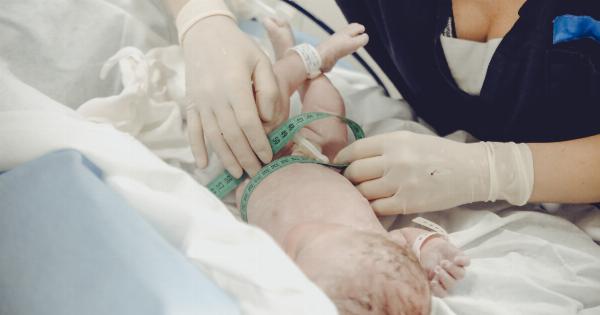When a newborn develops a high fever, it can be a cause for concern for any parent. Fever often indicates that the body is fighting off an infection, but it can also be a sign of a serious underlying condition.
In infants under three months old, a high fever should always be taken seriously and given prompt attention. Here are some tips for managing a high fever in newborns:.
1. Monitor the fever
It is crucial to monitor your newborn’s fever regularly. Use a reliable digital thermometer to take the temperature under the armpit, ensuring it is accurate and comfortable for your baby.
Keep track of the fever by noting down the time and temperature readings. This information will be vital for your healthcare provider if medical attention is required.
2. Dress your baby appropriately
When your newborn has a high fever, it is important to dress them in lightweight and breathable clothing. Avoid using multiple layers or heavy blankets, as it can trap heat and hinder the body’s natural cooling mechanism.
Opt for loose-fitting cotton clothes that allow ventilation and aid in regulating body temperature.
3. Provide ample fluids
A high fever can quickly lead to dehydration in newborns, so it is essential to offer frequent feedings if your baby is breast or bottle-fed.
Breast milk is especially beneficial as it provides necessary hydration along with vital nutrients and antibodies that help fight off infections.
4. Keep the environment cool
Create a comfortable environment for your newborn by keeping the room cool. Use a fan or air conditioner to maintain a moderate temperature, neither too hot nor too cold.
However, avoid placing your baby directly in front of a fan or air conditioning draft, as it may cause them to become chilled.
5. Use a lukewarm sponge bath
If the fever persists or climbs higher, you can help bring it down by giving your newborn a lukewarm sponge bath. Fill a basin with lukewarm water and use a soft cloth or sponge to gently wipe their body.
Avoid using cold water, as it can cause shivering, which generates body heat.
6. Consult a healthcare professional
Always seek advice from your pediatrician or healthcare provider if your newborn has a high fever. They will guide you on the best course of action and may need to examine your baby to identify the cause of the fever.
It is vital not to administer over-the-counter medications without medical consultation, as they may be unsafe for newborns.
7. Observe for other symptoms
While a high fever can be a significant symptom on its own, it is crucial to monitor your newborn for any accompanying signs of illness.
Keep an eye out for symptoms such as difficulty breathing, excessive fussiness, reduced feeding, a rash, or unusual drowsiness. Note down these symptoms and inform your healthcare provider for proper evaluation.
8. Maintain proper hygiene
During a high fever, it is vital to maintain proper hygiene for both yourself and your newborn. Wash your hands thoroughly with soap and water before handling your baby or any of their items.
Clean and disinfect surfaces regularly to prevent the spread of germs that may aggravate their condition.
9. Offer comfort and extra care
High fevers can be distressing for newborns, causing them to feel irritable and uncomfortable. Offer extra comfort by cuddling and soothing them. Use a soft cloth dipped in cool water to gently dab their forehead, which may provide some relief.
Ensure they get enough rest to aid in their recovery.
10. Follow medical advice
If your healthcare provider prescribes any medications or suggests a specific treatment plan, make sure to follow their instructions diligently. Administer any prescribed medications as directed and complete the full course, even if the fever subsides.
In case of any concerns or worsening symptoms, promptly contact your healthcare provider for further guidance.































